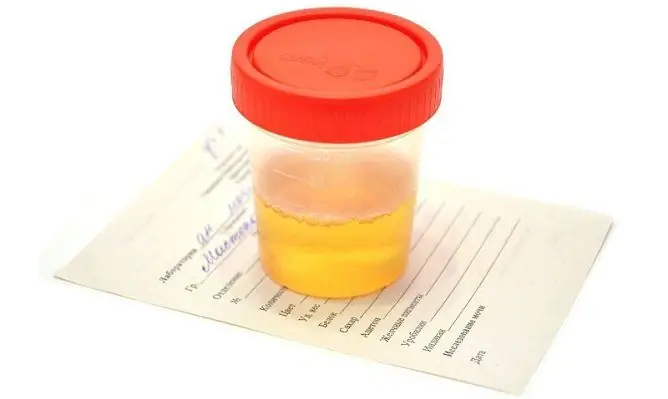- Author Rachel Wainwright wainwright@abchealthonline.com.
- Public 2023-12-15 07:39.
- Last modified 2025-11-02 20:14.
Can I donate urine during my period?
The content of the article:
- What is a urine test for?
- How to donate urine for analysis during menstruation
- How can the result of urine analysis be distorted during menstruation
It is undesirable to donate urine for laboratory research to women during menstruation, but in some cases it is impossible to postpone the analysis. For example, it may be necessary in case of emergency hospitalization, during preoperative preparation for an unscheduled operation, in conditions requiring urgent diagnosis. If a urine test is taken during menstruation, a doctor should be warned about this without fail.
Despite the fact that at the beginning and at the end of menstruation, the discharge is insignificant, it can distort the analysis result when it gets into the collected material, therefore, if possible, you should wait until the menstrual bleeding is complete.

It is best to wait until your period is complete to get a urinalysis.
What is a urine test for?
Urine is a waste product that is excreted by the kidneys and contains a large amount of impurities, the type and concentration of which are of diagnostic value. Deviation of urine indicators from the norm can signal diseases of the urinary system, metabolic disorders and other pathologies before the onset of pronounced symptoms.
General, or clinical analysis of urine is one of the most frequent laboratory tests, which is used to assess health status, diagnose diseases, and monitor treatment. This test is usually included in a routine routine check-up. An analysis of urine for the content of certain substances in it may be needed for a narcologist during a specialized examination.
For a general analysis, it is necessary to collect the first morning urine, for other studies, different conditions for collecting the material may be required (average portion of morning urine, daily urine, etc.).
Clinical analysis of urine includes determination of its physical properties (color, transparency, pH, specific gravity), chemical composition (protein, glucose, ketone bodies, bilirubin, urobilinogen, hemoglobin, nitrites, etc.) and sediment microscopy (detection of leukocytes, erythrocytes, cylinders, salts, epithelium, bacteria).
Analysis of urine collected during menstruation often requires re-examination after the completion of menstruation to exclude or clarify the diagnosis.
How to donate urine for analysis during menstruation
There are rules for the preparation and delivery of urine to prevent impurities from entering the material for analysis, which can distort the study result. The main problem of collecting urine for analysis during menstruation lies precisely in the fact that it is very difficult to avoid getting menstrual flow into the collected material due to anatomical reasons.
Preliminary preparation for the delivery of urine analysis is that for 1-2 days before the study, you should avoid intense physical activity, refuse to eat foods that stain urine (carrots, beets, food colors, vitamins). In the case of taking medications (especially diuretics), it is necessary to clarify with the doctor the need to cancel them before the analysis. In addition, before the study, you should limit the use of mineral water, which can affect the acidity of urine, and also stop drinking alcohol.
Before collecting urine, you must thoroughly wash your hands and conduct a toilet of the external genital organs (you should wash yourself from the vagina to the anus and thoroughly rinse the used hygiene product).
To collect urine, it is better to use special plastic containers that are purchased at a pharmacy or issued in a laboratory. In the event that it is not possible to purchase a pharmacy container, you can collect urine in a glass jar with a tightly screwed lid, which must be sterilized first.
For analysis, unless otherwise indicated, the first morning urine is collected. The initial portion goes down into the toilet, the rest is collected in a container so that the external genitals do not come into contact with the container. Clinical analysis requires at least 70 ml of urine. It must be delivered to the laboratory as soon as possible, no later than two hours after urination. Refrigerant can be used to deliver material to the laboratory in hot weather, but urine cannot be frozen.
In order to obtain the most accurate test result when collecting urine during menstruation, you must adhere to a number of additional rules.
After using the genital area, use a clean hygienic tampon (if not available, you can use a cotton or gauze swab) to help prevent menstrual blood from entering the collected material. It is convenient to collect urine with a tampon even outside of menstruation, as this avoids getting vaginal discharge into the material.

When collecting urine for analysis during menstruation, you need to use a hygienic tampon
If it is necessary to perform a bacterial culture of urine and there is no way to wait until the end of menstruation, it is recommended to collect urine in a hospital using a urethral catheter, this will exclude impurities from entering the urine. Likewise, you can collect urine during menstruation before urgent surgery.
How can the result of urine analysis be distorted during menstruation
The presence of impurities in urine changes its physical properties, chemical composition, and affects the composition of the sediment.
Normal urine is light yellow in color. During menstruation, urine may turn a purple hue, which is characteristic of some kidney problems. In addition, urine can become cloudy, which is an indicator of a number of diseases of the genitourinary system, liver, pancreas, and neoplasms.
During menstruation, urine specific gravity may be falsely high. It usually increases with diabetes mellitus, heart failure.
Urinalysis taken during critical days can detect an increased number of white blood cells, red blood cells, as well as cells of the inner layer of the uterus and mucus. A significant number of erythrocytes in the urine is noted in kidney disease, urolithiasis, neoplasms, arterial hypertension, etc. An increased number of leukocytes is observed in inflammatory processes in the organs of the urinary system. In addition, bacteria that are normally absent can be found in the material collected during menstruation.
In any case, urinalysis alone is not enough to make a diagnosis. However, results outside the normal range give rise to additional research.
YouTube video related to the article:

Anna Aksenova Medical journalist About the author
Education: 2004-2007 "First Kiev Medical College" specialty "Laboratory Diagnostics".
Found a mistake in the text? Select it and press Ctrl + Enter.






